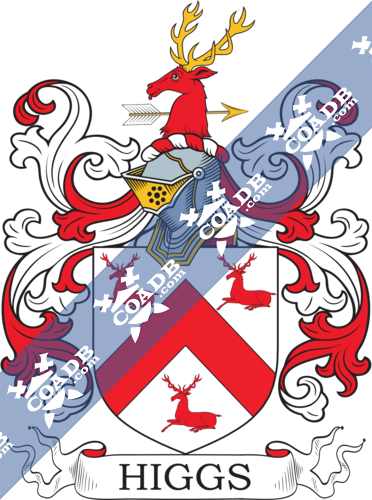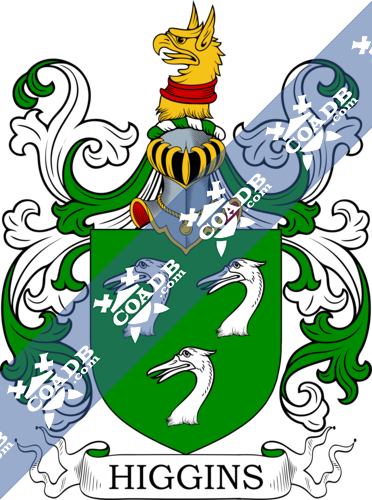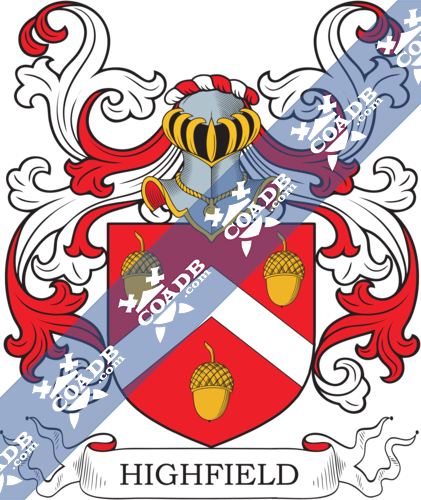Higgs Family Crest, Coat of Arms and Name History

Higgs Coat of Arms Gallery
Don’t know which Coat of Arms is yours?
We can do a genealogical research. Find out the exact history of your family!
Learn MoreHIGGS
The medieval English surname Higgs is a variation of the surname Hick, both names were a diminutive of given names Richard or Ricard, a given name which was introduced into Britain after the Norman invasion. In this context the name would be considered patronymic.
The variations in the spelling of the surname includes; Higgs; Higg; Higges; and Higge among others. The variations in spelling of surnames dating back to ancient times can be attributed to a lack of consistency regarding guidelines for spelling in use by the scribes who recorded such information, many of which were in the habit of spelling phonetically. The issue of multiple spellings of names in records was compounded by the diversity of languages in use in European countries at this time.
Until the Norman invasion and conquest, surnames were rarely if ever used. In the small settlements and villages which existed during earlier times in most of Britain, residents found little need for surnames as everyone in these communities knew each other and a given name would usually suffice. However, as communities grew and people began to migrate on a larger scale, along with the need of the government having a reliable way to track people for tax and census purposes, the Norman aristocracy’s penchant for using surnames seemed the appropriate evolution to this problem. In most instances to distinguish themselves, one from another, those not of the noble class would often be identified by their given name plus their occupation while others may have been identified by their given name and one of their parent’s names. There was a boundless supply from which surnames could be formed, in addition to the use of patriarchal/matriarchal names or reference to the individuals occupation, there were things such as defining physical traits, a familiar geographical location or a topographical landmark found near the individual’s home or birthplace, the name of the village in which the person lived, and so much more. Over the course or time, surnames would come not just to represent an individual but whole families.
One of the earliest record of any variation of this surname is that of Hugh Higge which appears in the Lincolnshire tax rolls from 1273. The tax rolls, were a series of census and tax records kept by the English Treasury by order of King John. These documents, the oldest dating back seven hundred years to the 12th century, are considered the oldest continuous set of records detailing English governance in the United Kingdom, these “Tax Rolls” were kept updated and used as a reference source until the early 19th century.
The task of record keeping was primarily the responsibility of the churches, priories, and government as literacy was often a skill found only among the wealthy, the clergy, and those in government. For practical purposes, governments found the use of surnames made the recording and tracking of people for census, taxation, and immigration purposes easier.
With the discovery of America, people began to immigrate to the “New World”. Some of the first recorded immigrants to America bearing the surname were John and Rachel Higgs who arrived in 1654 and settled in Virginia.
There were also immigrants to the British Commonwealth countries of Canada, Australia, and New Zealand bearing the surname. Millicent Higgs was one of the early settlers to Australia, arriving in 1838 and settling in Holdfast Bay. Francis and Jane Higgs arrived and settled in Adelaide in 1839. James and Ann Higgs along with their children, Sarah, James, and Henry were early settlers to New Zealand, arriving in 1873 and settling in Wellington.
Worldwide, the highest concentration of people with the surname Higgs are found in the United Kingdom, Australia, New Zealand, Canada and the United States. By state, the largest percentile of those with the surname Higgs live in Arkansas, Kentucky, Tennessee, Utah, and Virginia.
There are many persons of note who bear the surname such as British born Alan Edward Higgs, a businessman and self-made multimillionaire. Upon his death, Higgs’ wealth went to creating the Alan Edward Higgs Charity to help underprivileged children from Coventry. His son, Derek Alan Higgs, along with his sister were named the trustees of the charity.
Sir Derek Alan Higgs. Son of Alan Edward Higgs, was a businessman and merchant banker as well as one of the trustees of the Edward Higgs Charity. Higgs was knighted in 2004.
With the creation of the CERN and the large Hadron Collider project in Switzerland the noted physicist Peter Higgs’ theory of the Higgs-Boson or “God Particle” which explains how particles (the basic building blocks of the universe) had no mass at the start of the universe but acquired mass almost instantaneously at the moment of the big bang, or when the universe was created. Higgs’ theory was proven at the CERN facility in March of 2013. Higgs has been awarded the Nobel Prize for Physics which he shared with noted fellow physicist Francois Baron Englert, a Belgium scientist. Higgs lives in Edinburgh and still teaches at Edinburgh University Scotland.
Blazons & Genealogy Notes
(Collesborne, co. Gloucester). Ar. a chev. betw. three bucks couchant gu. Crest—A buck’s head gu. attired or, pierced through the neck with an arrow headed gold, feathered ar.







